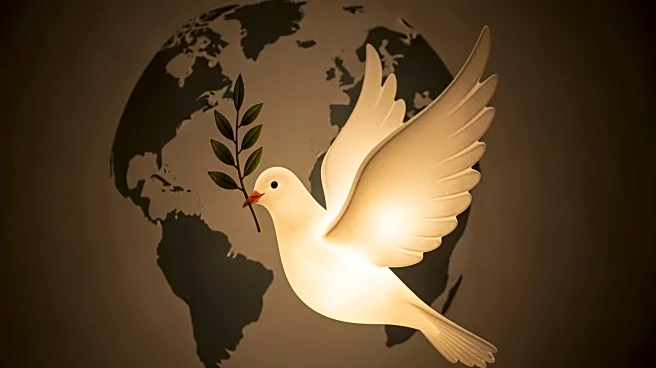What's Happening?
President Donald Trump and his supporters are actively lobbying for him to receive the Nobel Peace Prize in 2026, following his role in brokering a significant ceasefire that could lead to a long-term
peace settlement in the Middle East. The Nobel committee's decision may hinge not only on the sustainability of this peace deal but also on their perception of Trump's actions, such as pulling humanitarian aid and his rhetoric. Historically, U.S. presidents who have received the Nobel Peace Prize have used their acceptance speeches to reflect on the complex relationship between war and peace, acknowledging the ongoing struggles and the need for cooperation and diplomacy.
Why It's Important?
The potential awarding of the Nobel Peace Prize to President Trump could have significant implications for U.S. foreign policy and international relations. It would mark a recognition of his efforts in the Middle East, potentially bolstering his diplomatic credentials. However, it also raises questions about the criteria for such awards, especially considering Trump's controversial policies and rhetoric. The Nobel committee's decision could influence public perception of Trump's presidency and his approach to global conflicts, highlighting the delicate balance between peace efforts and the realities of ongoing international tensions.
What's Next?
If President Trump is awarded the Nobel Peace Prize, it could lead to increased scrutiny of his foreign policy strategies and their long-term effectiveness. The Nobel committee's decision may prompt discussions among political leaders and analysts about the role of rhetoric and humanitarian actions in peace-building. Additionally, Trump's acceptance speech, if he wins, will be closely watched for its tone and content, potentially setting a precedent for future laureates in terms of addressing the complexities of peace and conflict.
Beyond the Headlines
The debate over President Trump's potential Nobel Peace Prize highlights broader ethical and rhetorical considerations in awarding such honors. It underscores the importance of the acceptance speech as a platform for addressing global issues and promoting a vision of peace. The committee's decision could reflect shifting priorities in recognizing peace efforts, emphasizing the need for leaders to articulate a unifying vision that transcends political divisions and fosters global cooperation.











